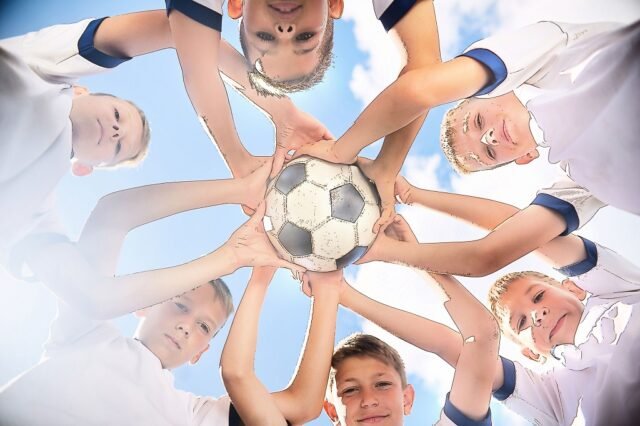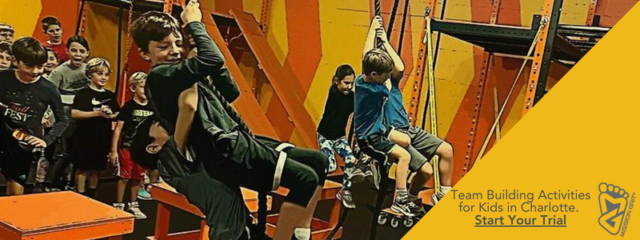How Important Are Team Building Activities for Kids?
Why is team building important for kids? It ensures individuals don’t just focus on themselves but make sure entire groups function well. The advantages of team building activities are many; kids improve problem-solving, listening, leadership, and creative thinking.
Whether it’s at school, college, or the workplace, everyone needs to be able to work with others to progress and succeed in life. At Mission Grit in Charlotte, we offer unique fitness programs with incorporated team-building activities to help kids cultivate these vital skills.
What Are The Benefits of Team Building Activities for Kids?
Building trust and learning how to mitigate conflict and communicate highlight the importance of team building in schools and life. When kids are young, they are especially curious about the world, and it’s the perfect time to teach social skills like cooperation in group dynamics and creative thinking.
- Leadership identification: Kids with a natural aptitude for leadership further develop their abilities, while those who don’t always take the lead have an opportunity to build confidence in their abilities.
- Boosts creativity: When kids play in teams, they bond with others and think of creative, out-of-the-box solutions to accomplish tasks. Moreover, they are frequently more creative in safe, low-risk environments.
- Improves self-esteem: Kids who feel part of “group work” develop a strong sense of solidarity, making them more invested in themselves and others.
- Refine communication: Working with others from diverse backgrounds and with different personalities teaches children how to navigate group dynamics and communicate effectively.
Teambuilding importance for kids should never be underestimated; a report by global consulting firm McKinsey & Company found diverse teams are more creative and perform better by 35%. And those who can navigate teamwork fare better at work and in life.
Types of Team Building Activities Suitable for Children

The English proverb “children should be seen and not heard” is no longer relevant in today’s climate. Communication is an inextricable part of the human experience; children who feel heard have the confidence to express themselves and believe their experiences are valid.
What are the benefits of team building exercises? Many, including how to communicate effectively in diverse settings. Through teamwork, kids learn to connect authentically with others and not just to communicate, but to articulate their ideas. Teamwork is something children learn naturally. However, because they need it throughout their lives, the consensus is it should be encouraged throughout schooling and adult life.
Current culture, exacerbated by social media, focuses on personal autonomy, which is why it’s important to encourage children to mix with others in a real environment, in different classes, outside of school confines, and not just through digital devices. Furthermore, the educational benefits of teamwork translate into college and workplace environments.
Communication
Poor communication leads to misunderstandings, conflict, and lost opportunities.
One of the benefits of team building activities for youth is that it helps young ones listen, develop empathy, and verbalization skills.
Teamwork
Group activities encourage kids to draw upon their natural strengths for the good of the team, teaching kids how to leverage their best selves in the service of others. They learn to appreciate others, interact positively, and pursue a common goal through teamwork.
Trust Building
When kids work together, honesty becomes a byproduct of their interactions, as any lying or deception would prevent them from achieving their goals. Effective teams learn to open up, share opinions and quickly resolve disagreements. No team can succeed without trust.
Examples of Team Building Activities For Kids

The purpose of team-building activities for students is to help students improve teamwork skills, leadership abilities and encourage them to step out of their comfort zones.
Field Games
These games encourage children to work together by completing tasks as a team, rather than having an individual winner. Games like the human knot, where kids have to untangle themselves without letting go of the hands they’re holding, and others like birthday line-up where they have to line up according to date-of-birth, for example, all promote collaboration.
Charades is another simple game of pantomimes where kids are split into teams. One member in each team has to “act out” a phrase without speaking, while the other members try to guess what the phrase is. The aim is for teams to guess the phrase as quickly as possible.
Sports
Team sports allow kids to socialize with friends and avoid spending too much sedentary time in front of screens.
One of the incidental advantages of teambuilding exercises, like sports, is that it allows children to be part of something bigger than themselves while teaching them the value of hard work, commitment, and dedication.
Whether it’s basketball, baseball, cheerleading, or basketball, any team sport is an excellent way to teach accountability. Not every game will be successful, and even if a kid just plays socially, they’ll have to take responsibility for the way they conduct themselves and their choices during the match
Escape Room
Escape rooms make excellent team-building field trips. They entail “locking” participants in a themed room, where they have to solve riddles, puzzles, and clues to find their way out (“escape”) within a set amount of time. These team-building activities have a lot to offer kids, from improving existing skills to character growth.
Escape rooms place kids in engaging situations and encourage them to think on their feet and find instant solutions while sharpening their problem-solving, critical thinking, and observational skills. Working together within a time frame supercharges creativity and teaches them how to manage time as a group, for example in camps, adding to the growing list of many reasons why team building is important.
Conclusion
We hope we’ve adequately answered “why is team building important in schools?” and perhaps life. It’s essential to realize team building permeates every facet of our existence. It teaches kids how to cope with the highs and lows in a group setting, as well as control their emotions and channel negative feelings positively.
If you’re looking for team-building activities or a fitness program for your kid, then check out Mission Grit in Charlotte. We help kids explore their potential through a range of ongoing after-school classes, summer camps, Youth Leadership Programs, and more. Claim a trial class today!
Kids Team Building FAQs:
Q: What is team building for kids?
A: Team building for kids refers to a series of activities or exercises designed to improve cooperation, communication, trust, and problem-solving skills among children. The activities aim to develop a sense of community and foster positive relationships among children.
Q: Why is team building important for kids?
A: Team building is important for kids because it helps them develop essential life skills such as communication, leadership, problem-solving, and collaboration. These skills will benefit them not only in their academic pursuits but also in their personal and professional lives.
Q: What are some team building activities for kids?
A: There are many team building activities for kids, including scavenger hunts, trust exercises, problem-solving challenges, group projects, and cooperative games.
Q: How do you choose team building activities for kids?
A: When choosing team building activities for kids, it is important to consider the age, skill level, and interests of the children involved. Activities should be challenging enough to encourage growth and development but not so difficult as to be frustrating or overwhelming.
Q: How can parents or educators facilitate team building for kids?
A: Parents or educators can facilitate team building for kids by providing a safe and supportive environment, modeling positive communication and problem-solving skills, and offering opportunities for children to work together and build relationships.
Q: What are the benefits of team building for kids?
A: The benefits of team building for kids include improved communication and collaboration skills, increased self-confidence, greater empathy and understanding of others, and a sense of belonging and community.
Q: Can team building activities be adapted for online or virtual settings?
A: Yes, team building activities can be adapted for online or virtual settings through the use of video conferencing, online games and activities, and virtual collaboration tools.
Q: How often should team building activities be done for kids?
A: The frequency of team building activities for kids will depend on the needs and goals of the group. Some groups may benefit from regular activities, while others may only need occasional activities to reinforce skills and build relationships.





